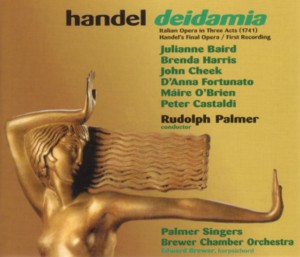This new première recording of Handel's
last opera Deidamia, under Rudolph Palmer, is released by Albany
Records (previous volumes in this series have appeared on the Vox and Newport
Classics labels). Composed at the end of 1740, after 35 years of experience in
the opera house, Deidamia is a valuable example of Handel's generally
unfamiliar late operatic style.
The tone of Deidamia is quite light,
and the heroic spectacle of the Royal Academy of Music operas seems a world
away. The story is set during the Trojan war. Young Achille has been sent to
hide from the war at the court of King Lycomede, and is currently disguised as
a woman and in love with the King's daughter Deidamia. The cunning Ulisse is
sent to find him, and succeeds in his mission when an apparently modest maiden
brandishes a sword with notable mastery. The humour and light hearted heroism
of the story is offset by Deidamia's inconsolable lament "M'hai resa infelice"
- she knows of the prophecy that foretells Achille's death at Troy.
The mood is mainly pastoral and the libretto
offers variations on love, restlessness, jealousy, opportunism and grief. The
result is one of Handel's most charming opera scores, full of wit and love of
life. Yet the audience is constantly aware of the future tragedy these events
will create. The cast is vocally average but all the singers are quite
involved in their characters. In the title role Julianne Baird is not without
charm, although she no longer completes ornaments and cadenzas with
such ease. Brenda Harris is an honourable Ulisse, quite agile and with a
competent trill. Unfortunately, D’Anna Fortunato’s dry voice and tense singing
is not what we can expect to personify a young hero like Achille. As with most
of the previous releases in this series, the Brewer Chamber Orchestra provides
an efficient yet underpowered accompaniment. Handel's scoring cries out for
dramatic contrast, and the continuo is particularly weak. Deidamia
definitely deserves to be heard, and even if this typically cut and patchy
John Ostendorf production is not of a very high standard, it is an adequate
tool for discovering and appreciating the work.


